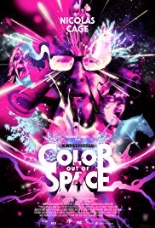
 H.P. Lovecraft’s short story “The Colour Out of Space” has been filmed several times since its 1927 publication, but none more imaginatively than Richard Stanley’s Color Out of Space. Despite its title being shorn of one vowel and an article of speech, it best captures the cosmic terror of Lovecraft’s classic.
H.P. Lovecraft’s short story “The Colour Out of Space” has been filmed several times since its 1927 publication, but none more imaginatively than Richard Stanley’s Color Out of Space. Despite its title being shorn of one vowel and an article of speech, it best captures the cosmic terror of Lovecraft’s classic.
One night, from the stars above the Gardners’ isolated alpaca farm, a meteorite comes crashing into the front yard. The media attention it brings, however limited, is unwanted by family man Nathan (a naturally unrestrained Nicolas Cage), yet a breeze compared to the threats that soon sprout — some quite literally. Infecting the water well — shades of George A. Romero’s The Crazies — the meteorite spreads madness and mayhem, inside and outside the Gardner home, and beyond. To fully align with the movie’s slow-burn cloak of impending dread, viewers are better off not knowing the details of the “how.” Suffice it to say, one late revelation is twisted into such a Cronenbergian knot, it may disturb even the desensitized.
 While many will see the meteorite’s invasion as the catalyst for an allegory of American familial dysfunction, it is more interesting to view the object as a representation of cancer — one with fast-spreading reach — as Nathan’s wife (Joely Richardson, Red Sparrow) is herself recovering from the disease as the film opens. That is at least more in line with the ecological bent of Lovecraft’s tale, here embodied by a visiting hydrologist (Elliot Knight, aka TV’s Sinbad) who never changes his Miskatonic University shirt.
While many will see the meteorite’s invasion as the catalyst for an allegory of American familial dysfunction, it is more interesting to view the object as a representation of cancer — one with fast-spreading reach — as Nathan’s wife (Joely Richardson, Red Sparrow) is herself recovering from the disease as the film opens. That is at least more in line with the ecological bent of Lovecraft’s tale, here embodied by a visiting hydrologist (Elliot Knight, aka TV’s Sinbad) who never changes his Miskatonic University shirt.
That said, you also can enjoy Color Out of Space for its surface-level lysergic trippiness, of which Stanley supplies plenty, making the film a magenta-saturated companion piece to Cage’s Mandy. Returning for his first feature in more than 20 years after his unceremonious firing from 1997’s The Island of Dr. Moreau remake (a whale of a tale told in 2014’s gotta-hear-this Lost Soul documentary) Stanley finally has the opportunity to make good on the enormous promise of his 1990 debut, Hardware. Not only does he not disappoint, but he also finds a way to film the unfilmable aspects of Lovecraft’s story, turning pulp into art. —Rod Lott
